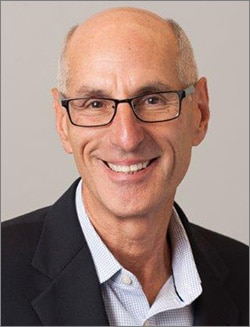Bruce Chizen, a special advisor to the Board of Directors, will match donations to CMT2 research on a one-to-one basis, up to $500,000. The former Adobe Systems CEO tells us why he thinks STAR research is such a good investment.
Why I Give: Bruce Chizen

When Bruce Chizen was diagnosed with CMT2 in 2016, the CMTA was the first place he turned to for help and information. His internist put a name to the symptoms that had bothered Bruce for most of his life, but discouraged him from having genetic testing because he couldn’t do anything about the results.
Unwilling to accept that answer, Bruce went to the CMTA website for a better understanding of the disease. Today he says that the help the CMTA provided him and the potential of finding a cure for the next generation made him want to assist the organization in any way possible.
In the past three years, he’s done just that. His first donation to the CMTA led to a breakfast meeting with CMTA Board Chair Gilles Bouchard, his Silicon Valley neighbor. That quickly led to a role as special advisor to the Board of Directors, where he brought his extensive business and nonprofit experience to the organization’s search for a new CEO.
That business experience began in Brooklyn, where he was born and raised “before it was cool.” His mother was a homemaker and his father owned a store specializing in radios and TVs—“the tech of its time.” Bruce thought he would be a teacher after studying health sciences at Brooklyn College, but early on discovered a knack for business. He started off as a salesman at Mattel Toys, selling the first wave of video games, then joined pre-IPO Microsoft in the mid-eighties as its East Coast sales manager. He moved to California to work for Claris, a software subsidiary of Apple, then joined Adobe for 14 years, seven as CEO.
Starting out with nothing left Bruce “very sensitive” to how nonprofits use his donations. “I’ve seen a lot of waste,” he says. Happily, he hasn’t seen it at the CMTA, which he calls “an extremely focused and effective organization.” Bruce praised the board’s entrepreneurship, and likens the business-focused STAR model to “what a venture capitalist would do with a startup,” engaging partners to provide needed services and capital.
“The path to a cure is possible and probable,” Bruce believes, “so the more money that can be raised to help with the research, the faster a cure can be had.” He’s encouraged by STAR’s progress in the past several years as he sees “success breeding success.”
Bruce also considers education and community services a “critical” part of the CMTA’s mission. It’s what drew him to the CMTA in the first place, and he sees the need for a continued strong presence in this space.
Bruce says he is “semi-retired” now, though he admits that his wife might dispute that characterization. He serves as a senior advisor to Permira LLC, a private equity fund, and as a venture partner for Voyager Capital, an early stage VC firm. In addition, he sits on a number of for-profit boards, including publicly listed Oracle Corp. and Synopsys Inc. He also continues to advise nonprofit institutions including KQED, a PBS affiliate, and the Silicon Valley Education Foundation.





